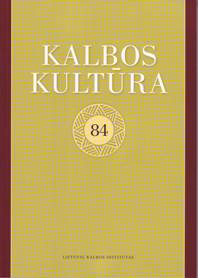Internetiniai sporto ir politikos straipsnių komentuotojų slapyvardžiai
Internet nicknames of the authors of the comments of sports and political articles
Author(s): Judita DžežulskienėSubject(s): Computational linguistics, Baltic Languages
Published by: Lietuvių Kalbos Institutas
Keywords: internet nickname; genre of comments; electronic discourse;
Summary/Abstract: The internet space is a very specific electronic medium with new features favourable for the functioning of personal names. An internet nickname, or a pseudonym, is a false virtual personal name, assumed by a recipient himself/herself rather than given by somebody else (parents, other people). By assuming a nickname, a person wants to be identified, attract other people’s attention rather than just introduce himself/herself.The choice of a virtual nickname is determined by a number of non-linguistic factors. Previously Lithuanian nicknames were mostly used in literature or for political reasons by figures of Lithuanian national movement. The nicknames were mostly used to disguise the actual personal data of the author: gender, age and profession. Nowadays internet nicknames do not only disguise the recipient’s identity, but often also create a new identity. To ensure successful communication, the new identity has features most relevant to the author.Nowadays the genre of comments, fairly popular in the internet discourse, emerges as a result of opportunities of communication offered by internet publications. The paper analyses the names assumed by the authors of internet comments who reply and react to articles published in the electronic space. The data has been collected from www.lrytas.lt, a site of political and sports news.The research results have demonstrated that part of the collected data could be treated as true nicknames, whereas the others are their functional equivalents, replacing the title, beginning of the comment or the addressee’s reference. The overview of true nicknames leads to a conclusion that the commentators make ample use of personal names, nationality, place of origin or living; less frequently they indicate their social status, professional or other affiliation, refer to a characteristic feature. To ensure their attractiveness or successful pragmatic effect,they often violate the language norm applicable to the structure and spelling of language units.
Journal: Bendrinė kalba (iki 2014 metų – Kalbos kultūra)
- Issue Year: 2011
- Issue No: 84
- Page Range: 230-239
- Page Count: 10
- Language: Lithuanian

